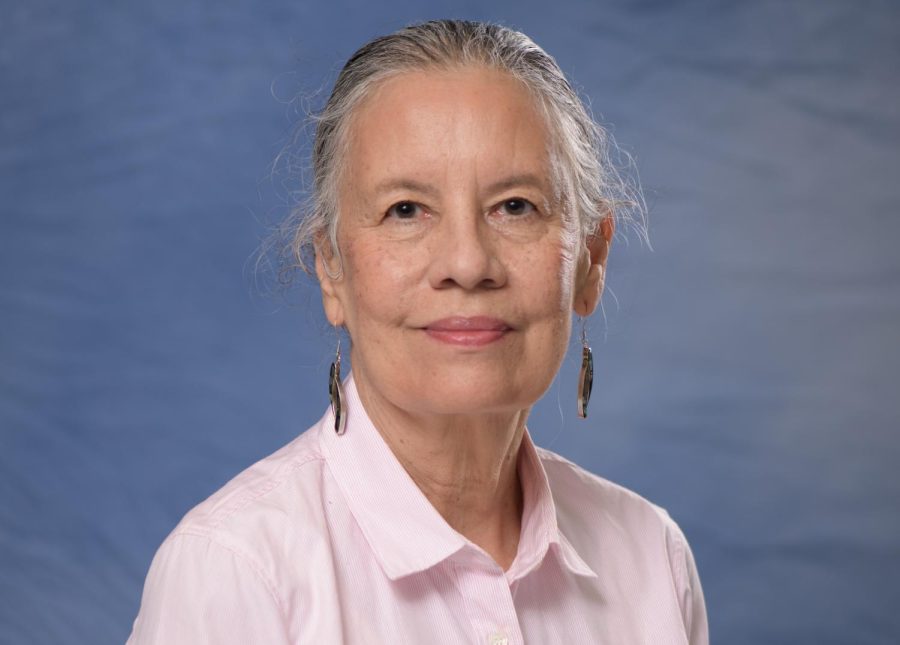New hire mends relationships with Native tribes
Jacki Rand, Associate Vice Chancellor of Native Affairs, devotes her time to mending relationships with native tribes in Illinois to make the University a more welcoming place for Native American students.
Nov 10, 2021
When Jacki Rand was a child, she was the kind of kid that was always asking, “Why?”
Rand said she never understood things about her family, like why her mother could not speak the Choctaw language, which her grandmother could speak.
But once she found out that her mother and her siblings had been taken from their families and forced into Indian boarding schools, she said so much of her family’s history began to make sense to her.
“In one generation, that line of transmission was broken,” Rand said.
Rand is now the Associate Vice Chancellor of Native Affairs at the University and started the position at the beginning of this semester. The first person to ever hold this new position, Rand is working to build relationships with Native tribes in Illinois and make the University a more welcoming place for Native American students.
Get The Daily Illini in your inbox!
Before coming to the University this August, Rand worked at the National Museum of the American Indian. After she left this position, she went on to teach at the University of Iowa.
There, she taught classes focused on Native American culture and policy and began working on a progress called the Indigenous Midwest. The digital research project seeks to remember Indigenous people who have called the Midwest home, despite a history of displacement and discrimination.
Rand grew up in Oklahoma with her mom, a member of the Choctaw nation and a white father in the Air Force.
Although the Choctaw nation is the third-largest federally recognized tribe in the United States, Rand said the national doesn’t have reservations they live on together. Because of that, Rand said it can be difficult to stay together and continue traditions.
“It’s made it particularly challenging for Oklahoma tribes to maintain a core kind of community,” Rand said.
When she was in graduate school at the University of Oklahoma, Rand said the idea of settler colonialism was only referenced around other countries, not in the United States. But as she learned more about it, Rand said she started to understand that that was what had happened to her family and the Choctaw.
Then, the term “settler colonialism” began to be used more and more as people began to understand what the United States had done to Indigenous people.
“We were able to develop a language as scholars that began to challenge the way our history was being misrepresented or being erased,” Rand said.
As Rand grew older and studied the history of Native American people in the United States, she said she began to understand what history lessons could teach her about her own family’s past.
“When I became an adult, I realized that I was part of a generation of native people who shared a common experience of being raised by survivors of the system that marked our relatives in different ways,” Rand said.
As a scholar of American Indian studies, a group she says is small and intimate, Rand said the University had been on her radar because of Chancellor Robert Jones’ work to move past the University’s history of displaying Native American imagery through the past mascot.
One of the most infamous symbols of the University’s relationship with Native Americans is Chief Illiniwek, whom many in the campus community say is racist and offensive.
Although the mascot was officially retired in 2007, the Chief image is still displayed on spirit wear at sports games and on decorations at businesses throughout Champaign-Urbana.
“The Chief tradition was an invention,” Rand said. “It can be uninvented.”
As someone working toward creating a more positive image of the University with Native American people throughout the county, Rand said the current displays of the mascot can set back progress.
“I have to be attentive to the fact that our visitors might randomly go into a bar that has Chief stuff on it,” Rand said. “And I have to be able to explain to them, these things are not what the University is about. That’s on the community of (Champaign-Urbana).”
As a new member of the Champaign-Urbana community, Rand said the Chief doesn’t deter her from the community.
Instead, she said she just makes the conscious choice to not support businesses that display the Chief.
“For a native like myself, I just vote with my feet,” Rand said. “I go where I’m not going to have to deal with that kind of thing.”
Rand said she has sent out her first letter to the Peoria tribe who were displaced by the University. She said that she will work with them in whatever they feel comfortable with.
But, she said the mascot still has a legacy that could make this outreach difficult.
“There are going to be some people out there who say, ‘you get no grace for me after that mascot,’” Rand said. “And we have to live with that.”






